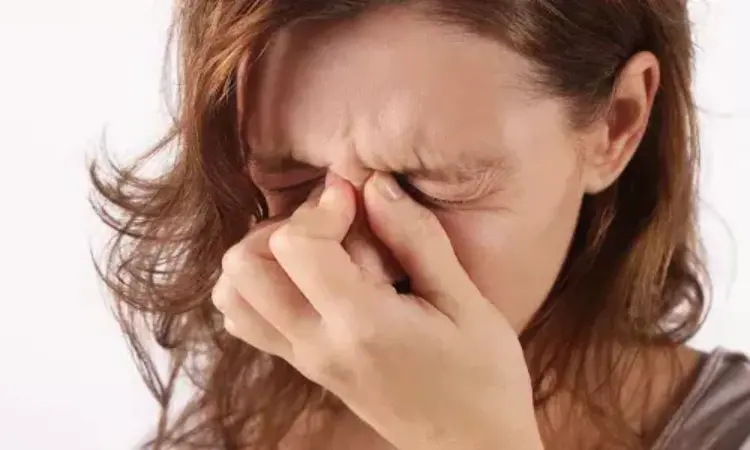- Home
- Medical news & Guidelines
- Anesthesiology
- Cardiology and CTVS
- Critical Care
- Dentistry
- Dermatology
- Diabetes and Endocrinology
- ENT
- Gastroenterology
- Medicine
- Nephrology
- Neurology
- Obstretics-Gynaecology
- Oncology
- Ophthalmology
- Orthopaedics
- Pediatrics-Neonatology
- Psychiatry
- Pulmonology
- Radiology
- Surgery
- Urology
- Laboratory Medicine
- Diet
- Nursing
- Paramedical
- Physiotherapy
- Health news
- Fact Check
- Bone Health Fact Check
- Brain Health Fact Check
- Cancer Related Fact Check
- Child Care Fact Check
- Dental and oral health fact check
- Diabetes and metabolic health fact check
- Diet and Nutrition Fact Check
- Eye and ENT Care Fact Check
- Fitness fact check
- Gut health fact check
- Heart health fact check
- Kidney health fact check
- Medical education fact check
- Men's health fact check
- Respiratory fact check
- Skin and hair care fact check
- Vaccine and Immunization fact check
- Women's health fact check
- AYUSH
- State News
- Andaman and Nicobar Islands
- Andhra Pradesh
- Arunachal Pradesh
- Assam
- Bihar
- Chandigarh
- Chattisgarh
- Dadra and Nagar Haveli
- Daman and Diu
- Delhi
- Goa
- Gujarat
- Haryana
- Himachal Pradesh
- Jammu & Kashmir
- Jharkhand
- Karnataka
- Kerala
- Ladakh
- Lakshadweep
- Madhya Pradesh
- Maharashtra
- Manipur
- Meghalaya
- Mizoram
- Nagaland
- Odisha
- Puducherry
- Punjab
- Rajasthan
- Sikkim
- Tamil Nadu
- Telangana
- Tripura
- Uttar Pradesh
- Uttrakhand
- West Bengal
- Medical Education
- Industry
Stapokibart Reduces Size and Symptoms of Nasal Polyps in Severe Chronic Rhinosinusitis: JAMA

Chronic rhinosinusitis with nasal polyps (CRSwNP) is a debilitating inflammatory condition of the nasal passages characterized by mucosal swelling, airway obstruction, impaired sense of smell, and reduced quality of life. Current standard treatment involves daily intranasal corticosteroids, with some patients requiring systemic steroids or surgical intervention. However, recurrence rates remain high, and effective biologic therapies are increasingly being studied to address persistent disease burden.
A new randomized clinical trial published in JAMA has found that stapokibart, a monoclonal antibody targeting type 2 inflammatory pathways, significantly reduced nasal polyp size and symptom severity in patients with severe CRSwNP already receiving standard intranasal corticosteroid therapy.
The study enrolled adults with inadequately controlled symptoms despite maximal medical therapy. Participants were randomized to receive stapokibart or placebo, both in addition to their daily corticosteroid regimen, and were followed for 24 weeks.
Results demonstrated that patients treated with stapokibart achieved a significant reduction in nasal polyp score compared with placebo, as assessed by endoscopic evaluation. Improvements were also observed in patient-reported nasal congestion, sense of smell, and overall symptom burden. Quality-of-life measures, including the Sino-Nasal Outcome Test (SNOT-22), showed meaningful improvement among those receiving the biologic therapy. Importantly, stapokibart was generally well tolerated, with adverse events limited to mild injection-site reactions and transient upper respiratory symptoms.
The authors emphasized that stapokibart provides a promising new option for patients with severe, uncontrolled CRSwNP who continue to experience polyp recurrence despite corticosteroid therapy. While longer-term data are needed to assess durability of response and safety, the findings support stapokibart as a potential addition to the growing class of biologics that address underlying inflammatory mechanisms in chronic airway disease.
Reference
Kim, J. H., Alvarez, M., & Gupta, R. (2025). Efficacy and safety of stapokibart for severe chronic rhinosinusitis with nasal polyps: A randomized clinical trial. JAMA, 333(7), 642–652.https://doi.org/10.1001/jama.2025.6421
Dr. Shravani Dali has completed her BDS from Pravara institute of medical sciences, loni. Following which she extensively worked in the healthcare sector for 2+ years. She has been actively involved in writing blogs in field of health and wellness. Currently she is pursuing her Masters of public health-health administration from Tata institute of social sciences. She can be contacted at editorial@medicaldialogues.in.
Dr Kamal Kant Kohli-MBBS, DTCD- a chest specialist with more than 30 years of practice and a flair for writing clinical articles, Dr Kamal Kant Kohli joined Medical Dialogues as a Chief Editor of Medical News. Besides writing articles, as an editor, he proofreads and verifies all the medical content published on Medical Dialogues including those coming from journals, studies,medical conferences,guidelines etc. Email: drkohli@medicaldialogues.in. Contact no. 011-43720751


